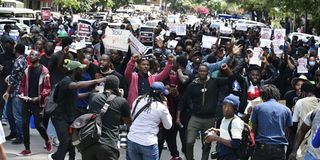Premium
'Occupy Parliament' protests: Clergy, civil society urge government to back down

Protestors walk along Kimathi Street as they take part in the protests against Finance Bill, 2024.
What you need to know:
- Dr Ole Sapit advised the government to stabilise the country economically, politically, and socially before embarking on the taxation rampage.
- According to him, anything that touches on food security touches on normal security. “Because when incomes are dwindling, people will find other ways of surviving, including crime, burglary and theft.”
Lobby groups and religious leaders have called for accountability in the government on a day Kenyans took to the streets to oppose the Finance Bill 2024.
Speaking in separate events, the church urged the government to tone down its zeal on taxation while the lobby implored the state to back on what they termed as retrogressive to the gains made since independence.
The clergy warned that if the taxation continued, “people will close shop, the taxable community will shrink and job losses will be realized” as civil societies called on Kenyans “to get out of their comfort zones.”

A man displaying placards while a police officer(right) fires a tear gas canister in Nairobi on June 18, 2024 during a protest against the Financial Bill 2024.
“We are going to have an unemployment rate very high. It will increase insecurity in this country and it will make this country hard to govern when people are less in their income earnings,” said ACK Archbishop Jackson Ole Sapit.
He was speaking during the opening of the 5th National Symposium of the Anglican Development Services (ADS) in Nairobi when he asked the Members of Parliament to be considerate and sober up to the reality that Kenyans are already economically stifled.
Dr Ole Sapit advised the government to stabilise the country economically, politically, and socially before embarking on the taxation rampage.
According to him, anything that touches on food security touches on normal security. “Because when incomes are dwindling, people will find other ways of surviving, including crime, burglary and theft.”

Journalists and Police on standby during the anti-Fnance Bill protests in Nairobi on June 18, 2024.
He added: “Because the government must run, we must have a realistic budget. Punitive taxation is unacceptable. Punitive taxation is going to harm Kenyans and is not going to allow us to grow.”
At the same time, the Green Belt Movement (GBM) called for accountability, arguing that the country was walking a path it walked decades ago since “there is little assurance that funds raised through new measures proposed in the Finance Bill will be used responsibly and for the intended purposes.”
The contentious proposed Finance Bill seeks to introduce tax measures that, according to GBM, will disproportionately affect the lower and middle-income class. This category, GBM said, is already struggling with high costs of living and increased taxation is bound to exacerbate poverty and widen the gap between the rich and the poor.

A woman is arrested while marching to parliament in Nairobi on June 18, 2024, during a protest against the Financial Bill 2024.
The GBM chairperson Nyaguthii Chege explained that as it was in the 90s, the IMF and the World Bank were lending Kenya money and that came with unrealistic demands.
“The question is, you raise money and you need to be accountable to the people who you are raising in their name,” said Ms Nyaguthii.
Kenya, she explained, is grappling with a burgeoning debt crisis, with the national debt reaching unprecedented levels.
“The 2024 Finance Bill, if passed, will likely involve increased borrowing to cover the budget deficit. This additional debt burden is unsustainable and threatens to plunge the country deeper into a financial abyss,” added GBM Executive Director, Dorothy Aseyo.
On their part, the Consortium of Civil Societies vowed to oppose what they termed as repressive policies, explaining that the demonstrations witnessed were just but the beginning.
The finance bill 2024, the consortium said, “is ill-advised, poorly thought out and maliciously drafted”, and vowed to oppose it.
“The consortium of civil societies expressly and unequivocally chooses to stand with the last man in the last lane, the depraved and the hopeless,” said the Consortium of Civil Societies chairperson Peter Agoro.


